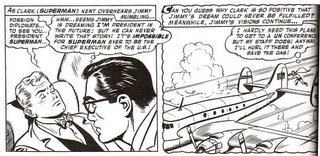Lessons Learned From Showcase Superman: "Play Along At Home"
 With the Infinite Crisis perhaps indicating a return to a Silver Age mentality ... how did those books work? What were the techniques and tricks? I finally picked up Showcase Presents: Superman - Volume 1 this past week, and cracked it open this weekend. It's great fun with impressive print quality, and gave me some enjoyable reading throughout the weekend. I'm not usually they type to highlight in books, or to take notes wile reading ... but things kept hitting me about these books, and I grabbed a stack of tiny Post-Its to record some of the traits and conventions of these Silver Age stories. It's by no means new ground ... but I'll cover it anyways.
With the Infinite Crisis perhaps indicating a return to a Silver Age mentality ... how did those books work? What were the techniques and tricks? I finally picked up Showcase Presents: Superman - Volume 1 this past week, and cracked it open this weekend. It's great fun with impressive print quality, and gave me some enjoyable reading throughout the weekend. I'm not usually they type to highlight in books, or to take notes wile reading ... but things kept hitting me about these books, and I grabbed a stack of tiny Post-Its to record some of the traits and conventions of these Silver Age stories. It's by no means new ground ... but I'll cover it anyways.
First up is the common thread between the panels below:
Besides the missing art of direct address that's been wonderfully discussed by Fraction and Casey in "The Basement Tapes", there's also a sense of direct engagement, of asking the reader to participate and interact with the comic. You can't be Superman, but you can "play along at home" by solving the mystery as he does, or even figuring out something before he can. From figuring out a puzzle that's put in front of you, to knowing constitutional limitations on the President's citizenship, to simply figuring out motivation: the reader is always encouraged to take an active part in the story.
The exact definition of the "Ages" of comics always eludes me, but this certainly isn't restricted to the early days of the Silver Age. I remember when I first started enjoying comics in the Carter Presidency, this was still a staple. Particularly in the various Batman books, there was often a nugget of fact on which the story would hang. Though the direct address used here was already waning, there was still an implicit understanding that there was a puzzle which you could solve. If you knew that fact - if you were in on the secret knowledge that Batman would use - you were a step ahead, and had a personal investment when the solution was revealed.
I can't remember the last time I've seen this in a comic: the encouragement to the reader to participate, instead of to consume. Much is made of the fact that the youth audience that used to read comics has now moved on to video games, and there's a sense that they've been captured by the hyperkinetics of gaming. It may be, in part, true ... but they also get to interact, to participate, and to feel reward. Comics have certainly raised their emotional maturity, and instituted complex storylines and continuity ... but neither of these scratch the same itch that puzzle-solving does.
With today's market, I don't know that simple puzzles would work anymore. With a reading audience that ranges wildly in education and age, puzzles are hard to construct. It still seems to me that there should be room in today's comics for some "fair play mysteries" that allow the reader to participate on a level beyond merely absorbing the story. Some of this played into the buzz over Identity Crisis, as fans hotly debated the identity of the murderer. It can be seen in the continuing excitement about the traitor in The Ultimates.
Given proper clues (unlike Identity Crisis), it's fun to play along. The SIlver Age knew it, and it's one of the lessons learned from Showcase Presents: Superman - Volume 1.
Tags: Comics




3 comments:
I really miss those puzzle stories! I think they survived as far as 70s Batman stories (no surprise there) like Dennis O'Neil's 'Vow from the grave'. Maybe DC should poach some *mystery* writers (as opposed to crime fiction writers), post-IC.
I don't think it requires bringing in outside writers; the only thing necessary is encouraging a sense of play among current writers, rather than sending them the message that fun is bad. Because, see, writers write what they know their editors will buy.
That said, some writers can do this more easily than others. Warren Ellis is actually closest of any current writer to the Golden Age ideal of making his stories blatantly educational, bizarre as that sounds...but I would pee myself laughing to see him write something like "Impossible! This space shuttle could never have landed on Mars -- and I can PROVE it! Reader: can YOU spot the clue this disillusioned astrophysicist has discovered?"
God, I would pay good money to see that.
Warren Ellis is actually closest of any current writer to the Golden Age ideal of making his stories blatantly educational
I think an Ellis puzzle system would be brilliant - he seems to be almost edging around it in Fell. It's just that the information you need is very, very obscure.
Besides him, I could really see Millar, Morrison, Waid, Busiek, all those guys doing that style of story well.
Post a Comment